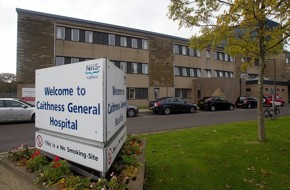Highlights
- Achieving Alliance for Water Stewardship Standard for water management; the 1st in the UK and the 1st hospital in the world to reach this.
- Reducing the environmental impact of healthcare.
- Reducing pharmaceutical wastage.
- Strong stakeholder and community engagement.

NHS Highland (NHSH) is the most remote and rural mainland health board in Scotland covering 41% of its land mass, providing sustainable healthcare services to a population of 320,000. Caithness General Hospital (CGH) in Wick offers local people access to general medicine/surgery/ midwifery services, diagnostics, A&E, and limited high dependency, renal and palliative care services with 68 beds. CGH also hosts an on-site laboratory and pharmacy.
CGH has become the first hospital in the world to achieve certification according to the Alliance for Water Stewardship (AWS) Standard, the global benchmark for environmentally and socially responsible water management. The implementation of the AWS Standard at CGH demonstrates leadership and a strong multi-agency collaboration.
NHSH aims to improve and protect the health of its people, whilst delivering its services sustainably and reducing the impact on the health of the environment. This includes tackling pollutants to water. The presence of pharmaceutical residues in water is recognised internationally as an important public health and environmental issue. Hospitals are key point-sources for pharmaceuticals which go into public wastewater systems and are difficult to filter out; this results in them being present in the effluent from wastewater treatment plants and then being discharged into surface waters. Even low concentrations in the environment can have unintended, negative impacts on freshwater ecosystems and can promote the development of antimicrobial resistance.
The quality of the used water discharged from CGH into the sewerage system, and onwards into the environment, was a key focus of the implementation of the AWS Standard alongside improved efficiency of water use within the hospital.
The discharged water, both before and after it had passed through the water treatment plant in Wick, was tested by the Environmental Research Institute at the University of the Highlands and Islands (UHI), revealing the extent of pharmaceutical residues discharged by the hospital (as well as from local households), still present in the water after treatment. This enabled NHSH to develop an action plan to reduce the impact of pharmaceuticals including substituting the most environmentally harmful medicines for less toxic ones, developing public messaging, conducting a medicines waste ‘amnesty’ to prevent unused pharmaceuticals being flushed down toilets, and testing new technology to remove pharmaceuticals.
CGH also drew up a plan to identify and implement opportunities to improve efficiencies in water use within the operations of the CGH site. The water action plan will save 33% of water and sewerage costs (shared value to Scottish Water in decreased energy use and carbon footprint), reduce costs to society by decreasing anti-microbial resistance, reduce contamination of the food chain, and mitigate climate change effects on water.
NHSH worked with a range of partners including the One Health Breakthrough Partnership (Scottish Water, SEPA, UHI, NHSH), Scottish Government, and Aurora Sustainability Group, to assemble the evidence portfolio. They continue to work with a range of stakeholders, including community groups, to further enhance social values generated from improved water stewardship.